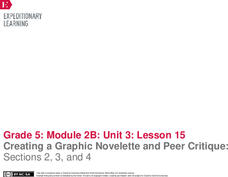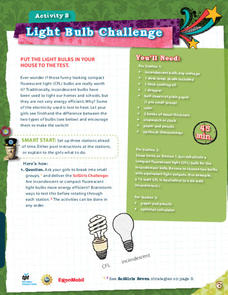Center for History Education
The Non-Importation Movement
Boycott for free trade! An eye-opening lesson explores the non-importation movement created by American colonists in response to the Stamp and Sugar Acts. Scholars specifically look at the impact the boycott had on colonial women who had...
American Museum of Natural History
Edible Earth
Create an edible model of the Earth using crispy rice cereal, marshmallows, and chocolate, yum! Model layers include the outer core, inner core, mantle, and crust.
PBS
Out and About
Field guides are a like a window into an ecosystem. Young scientists collaborate to create their own field guides by recording observations from a local ecosystem. Ideally, they collect information over time to create a more complete...
PBS
Bogged Down
Enjoy a hands-on lesson that will certainly hold water with your classes. Young scientists design an experiment to determine the materials that absorb water the best. They test both man-made and nature-made materials and conduct...
PBS
House Warming
Things should heat up during a hands-on lesson exploring solar energy. An enlightening activity challenges young scientists to design a structure that collects solar energy efficiently. They keep track of temperature data over time and...
EngageNY
Creating a Graphic Novelette and Peer Critique: Sections 2, 3, and 4
Let's get creative! With the fun resource, pupils continue working on their graphic novelettes about an invention, adding text and images to each section. When finished, they engage in a peer critique process, giving and receiving...
Bonneville
Solar Pathfinder Tutorial
Find the right path to learn about solar energy. Scholars set up and use Solar Pathfinders to take measurements related to solar insolation at a particular site. Based on the data, they estimate the solar potential in kWh/m^2/day of a...
Bonneville
Macro-Scale Solar
There's no substitute for the power of the sun. The second of four installments of the Solar Resources Assessment unit looks at macro-scale photovoltaic (PV) technology. Future scientists first learn about PV modules with a PowerPoint...
Bonneville
Simple Solar Tracker
Let the solar cells fight each other for supremacy! Given a functional solar tracker that moves toward light, groups copy the design to build their own devices. They use two sets of solar cells that have reverse polarization, so that the...
University of Florida
Six Bits of Abiotics
Collect clues and unwrap a mystery in an intriguing study about air pollution and urban forests. Teams share information to explore abiotic interactions and forest health. Scholars create a concept map using newly acquired knowledge and...
University of Florida
A Walk in the Woods
Take class members on a field trip to the forest without leaving the classroom. Scholars learn content-related vocabulary and factors affecting forest health with class discussions and during a presentation. Scientists combine forestry...
Exploratorium
A Splash of Color - Is Pure Water Colorless?
What makes the ocean blue but a glass of ocean water nearly colorless? Investigators prepare tubes of water to examine the color of water. Scholars discover the relationship between light absorption, color variations, and water depth as...
Exploratorium
Antibody Attack - Discover How Antibodies Launch Attacks on Invaders
Jump into the action and help antibodies defend against an antigen attack! Investigators match antibodies with antigens to model the body's identification and recall of specific pathogens. Young biologists also recognize that each...
PBS
Sink or Swim?
What's with all the numbers on plastic products? Learners complete an in-depth analysis of the physical properties of the different plastic types. They connect the properties of the plastics to uses and test their observation skills by...
PBS
Plants Count
Changes to habitats mean changes to resources. Groups examine aerial maps to predict areas of low and high plant resources. After formulating a plan, they visit the areas to collect data about the plant resources and then share their...
PBS
Light Bulb Challenge
Efficiency equals money where homes are concerned. A comparative lesson asks learners to measure heat output of incandescent and compact fluorescent light bulbs. They follow their investigation with calculating the cost of using the two...
PBS
Going Green
Trash is where it's at! Using bags of garbage collected from the school, learners sort the contents into categories based on type of material and collect data on the results. The data may include weight, volume, and/or percent of the trash.
PBS
Color Code
Don't let your brain play tricks on you! Learners test brain reaction rates while it is receiving multiple stimuli. They time each other reading a set of color words written in different colors and again when they are written in black....
PBS
Breaking Point
Leaf toughness can add to its herbivore appeal. Learns design an experiment to quantify leaf toughness and then perform their procedures. They follow the experiment with a set of questions that ask them to think about how leaf toughness...
PBS
Blowin’ in the Wind
Wind energy is making a comeback recently, and classes will want to take part! A hands-on lesson asks groups to build their own windmill that will lift a cup with varying weight. They use their windmill designs to experiment with angles,...
PBS
Bird is the Word
Tracking area birds can tell a lot about an ecosystem. Learners use that understanding as motivation to observe and record bird populations in their area. They use journaling to store their information and ultimately choose one bird as...
PBS
All Tangled Up
It is a tangled web the ecosystem weaves. Learners begin an activity on ecosystem interactions by building a food chain and then a food web with yarn as a group. To finish, they research local environmental changes that may impact the...
PBS
Super Sleuths
There's no such thing as the perfect crime! Your class of sleuths are ready to investigate the trace evidence at a crime scene and compare it to a list of suspects. They use their investigative skills to record physical properties of the...
PBS
Print Hints
It would be a crime not to give the lesson a chance! An inquiry-based lesson has pupils assume the role of crime scene investigators as they make observations about shoe prints. They look for patterns in the prints such as distance and...

























